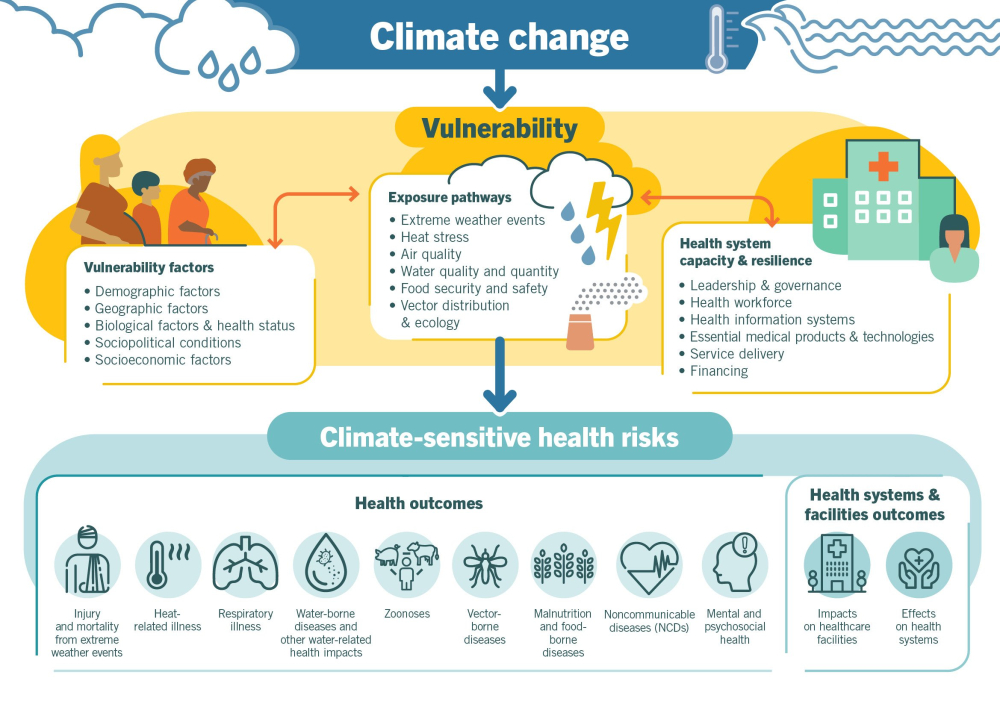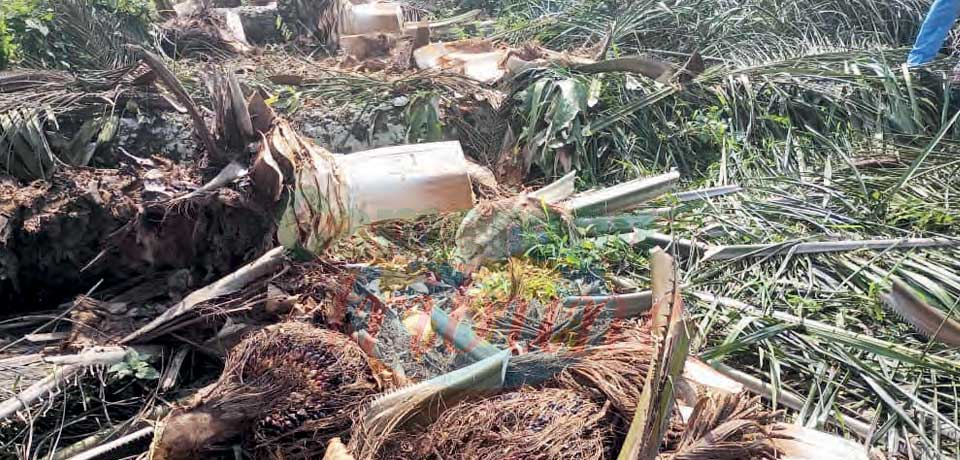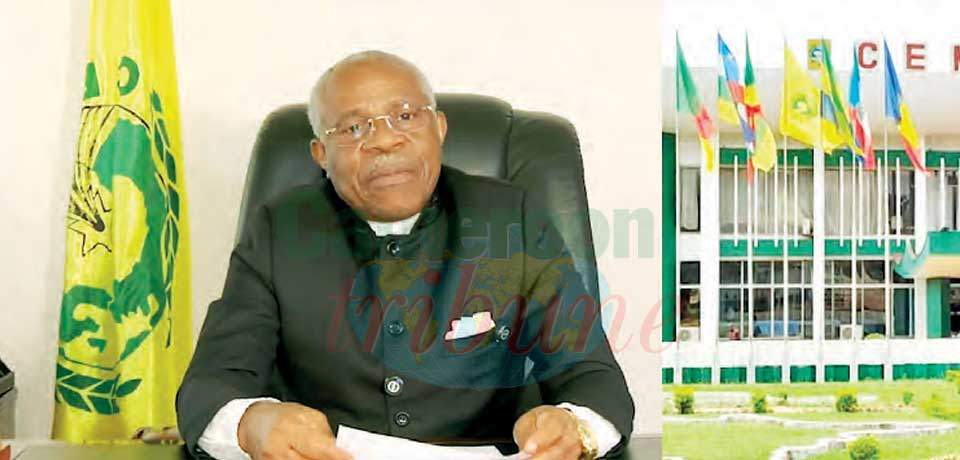Climate Change And Health: How Health Professionals Can Influence Policy, Curb Impact
- Par Kimeng Hilton
- 26 May 2023 18:09
- 0 Likes

The training was organised in Yaounde on May 26, 2023 by the Pan-African Climate Justice Alliance, PACJA and the Africa Coalition for Sustainable Energy and Access, ACSEA.
“The workshop was on the relationship between climate and health. It was justified by the fact that climate change has tremendous impact on public health. It modifies the environmental and the social determinants of health,” explained Eugene Nforngwa, Lead Expert on Just Transition and Energy Access with PACJA. “For example, some areas of Cameroon that used to be cold and did not have malaria now have it because they have become warmer. Because mosquitoes live in these areas and transmit malaria,” Nforngwa said.
Climate Change In Policymaking
He spoke in Yaounde on Friday, May 26, 2023 during the capacity-building workshop on climate change and health for workers in the health sector. It was organised by the Pan-African Climate Justice Alliance, PACJA and the Africa Coalition for Sustainable Energy and Access, ACSEA. According to Nforngwa, climate change affects the capacity of households to take care of their health needs. When farmers lose their crops, cattle or other sources of livelihood and their incomes drop, when they fall sick, it becomes more difficult for them to access medical care. It is important for this dimension to be considered in making policies and responding to climate change, Nforngwa explained.
Spending On Climate Change, Health
On the other hand, climate change affects the ability of health systems to function adequately. A recent study shows that African governments are spending five times more on dealing with the impact of climate change than on healthcare. This means that resources are drained from the health sector by the impact of climate change. Nforngwa said climate change has multiple impacts on health – in terms of disease distribution, the cost of treatment and the capacity of health systems to respond to daily healthcare needs and health emergencies.
Climate Change And Health
The workshop addressed three main issues: the impact of climate change on the health sector, the strategies for strengthening the health sector to respond to climate change impacts, and how the measures for mitigating climate change contribute to the improvement of health. The 35 workshop participants were various professional backgrounds such as health policy development, health research, health worker training, clinicians, public health, epidemiology, climate scientists and farmers. The participants came from all over Cameroon.
Linking Climate Change To Health
The goal of the workshop was to strengthen the capacity of participants to raise awareness on climate change and health. “Health sector professionals are often aware of the relationship between climate change and public health. We want them to begin to make this linkage. We hope they may also influence policies and practices at their level. If health policies in Cameroon were to be revised, the workshop participants will serve as ambassadors by reminding the authorities not to forget the climate change component,” Eugene Nforngwa noted.
Need For Linkage Research
“Eventually, we want to have a community of health professionals, who in their daily work integrate climate change dimensions. We have already created a Climate Change and Health Working Group. They will continue to push the agenda by conducting research to help the public understand the link between climate change and health. They will also advocate policy change,” Nforngwa disclosed.
A Global Problem
Dr Leonard Ngarka, a neurologist with the Yaounde Central Hospital, and head of the ACSEA Climate Change and Health Working Group, spoke on climate change and health. “Statistics show that climate change impacts the social and environmental determinants of health such as food shortages, reduction in rainfall and increase in atmospheric temperatures. This means climate change is impacting man globally,” Dr Ngarka noted.
Natural Disasters And Health
“We have been experiencing the impact of climate change in our health system. For example, the recent cases of landslides in Damase, Yaounde and Ngouache, Bafoussam some few years back. Natural disasters cause the mass movements of people who overcrowd health facilities where they are resettled. This reduces the likelihood of them receiving quality healthcare because the host health facilities are not adapted to handle such influx of people,” Dr Ngarka warned.
Impact On Access To Healthcare
He continued: “Those with chronic conditions like HIV/AIDS, tuberculosis, or who take medication sponsored by government and who had subscribed in a particular health unit, face some challenges when they are forced to move as a result of natural disaster. Their treatment is often interrupted while they wait to be integrated in the new health unit where they have moved to. And so climate change impacts the ease with which people access healthcare.”
Climate Change And Disease Spread
“Climate change also impacts water supply. For example, Cameroon is undergoing a cholera outbreak. Reports from the Ministry of Public Health on Friday, May 26, 2023, said about 400 people have already died from the outbreak. Cholera is a food-borne disease mostly transmitted through poorly washed fruits and food people consume. People cannot properly wash the fruits and food they consume if they do not have enough water. Climate change affects water supply, thereby causing cholera and air-borne diseases. When it results in increased temperatures, people suffer from dehydration, which affects kidneys and the brain. Climate change and extreme temperatures can result in psychosis,” Dr Leonard Ngarka went on.
Still according to the neurologist, there are many effects of climate change on health. “That is why the working group was put in place to discuss what can be done to curb the burden of the global problem on health systems. The first objective is to educate people on the impact of their actions. As well as carry out research that might be needed by policymakers or the government to take decisions on climate change and health.”
Taking Advantage Of Decentralisation
“We will take advantage of decentralisation by working with local government authorities, as well use local resource people to help solve the problem of climate change. Climate change is not a myth, it is real! It is serious! It affects everyone in Cameroon. We need to put our hands together to see how we can curb climate change because it has direct impact on our health,” Dr Ngarka pointed out.
Climate Change And Mental Health
The month of May is observed as Mental Health Awareness as parts of the world experience early-season heat waves, says a new investigation. Which draws connections between extreme heat, mental health, and human rights. Writing for TIME magazine, American journalist Aryn Baker looks at how rising global temperatures due to climate change are leading to more frequent and intense heat waves, with severe consequences for human health and well-being.
The Risks Of Rising Temperatures
The report, amongst others, explores how heat impacts brain health, a connection that is just beginning to take hold in broader conversations about mental health. When temperatures spike, so do the rates of hate speech, violence, and suicide. A single-degree increase in temperature above normal contributes to higher probabilities of depression and anxiety. People experiencing mental health conditions are also especially at risk of heat-related fatalities, the study says.
U.S. Prisoners At Risk
In the U.S. prison system, a growing number of people with pre-existing medical conditions and mental health concerns are particularly susceptible to heat-related illnesses. Baker’s report highlights the rise of heat-related deaths in prisons, where incarcerated individuals face oppressive heat exacerbated by climate change, poor ventilation, and inadequate air conditioning. Meanwhile, 70 per cent of Texas prisons lack air conditioners in cells and common spaces, Baker reports.
“In the context of climate change, an air conditioner is not a luxury. It is a human right,” Julie Skarha, an environmental epidemiologist at Brown University’s School of Public Health, told Baker. “We have to start thinking about climate change as a mental health crisis,” says Robin Cooper, an Associate Clinical Professor at the University of California, San Francisco and President of the Climate Psychiatry ...
Cet article complet est réservé aux abonnés
Déjà abonné ? Identifiez-vous >
Accédez en illimité à Cameroon Tribune Digital à partir de 26250 FCFA
Je M'abonne1 minute suffit pour vous abonner à Cameroon Tribune Digital !
- Votre numéro spécial cameroon-tribune en version numérique
- Des encarts
- Des appels d'offres exclusives
- D'avant-première (accès 24h avant la publication)
- Des éditions consultables sur tous supports (smartphone, tablettes, PC)














Commentaires